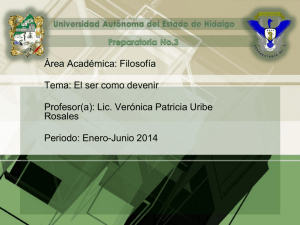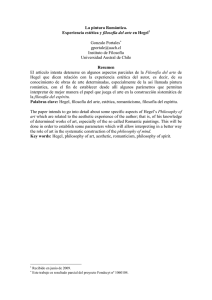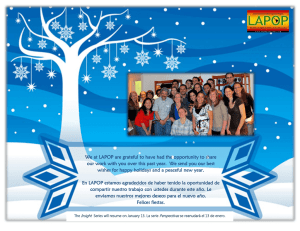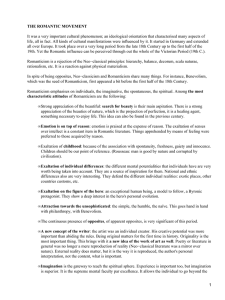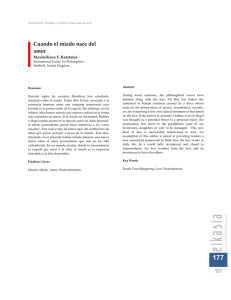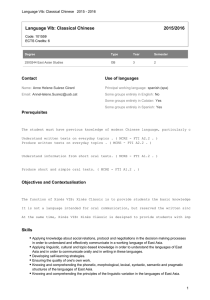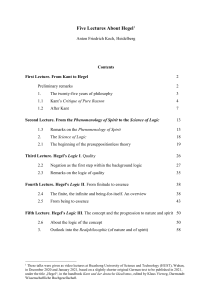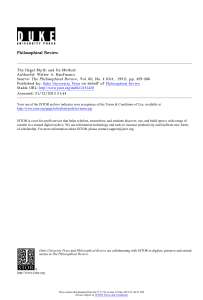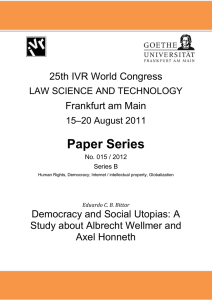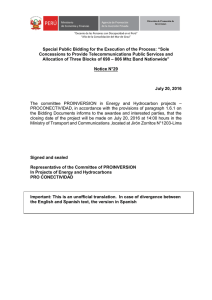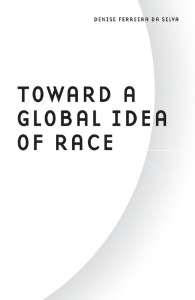LIKE A PLANTATION OWNER AMONG HIS SLAVES
Anuncio
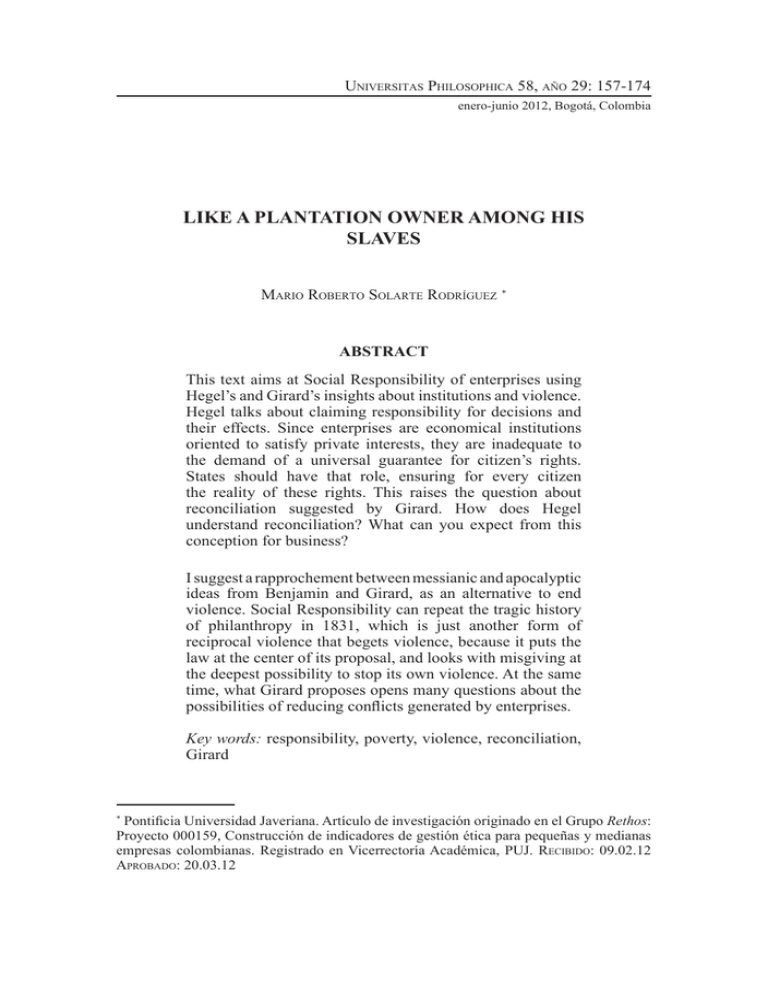
Universitas Philosophica 58, año 29: 157-174 enero-junio 2012, Bogotá, Colombia LIKE A PLANTATION OWNER AMONG HIS SLAVES Mario Roberto Solarte Rodríguez1* ABSTRACT This text aims at Social Responsibility of enterprises using Hegel’s and Girard’s insights about institutions and violence. Hegel talks about claiming responsibility for decisions and their effects. Since enterprises are economical institutions oriented to satisfy private interests, they are inadequate to the demand of a universal guarantee for citizen’s rights. States should have that role, ensuring for every citizen the reality of these rights. This raises the question about reconciliation suggested by Girard. How does Hegel understand reconciliation? What can you expect from this conception for business? I suggest a rapprochement between messianic and apocalyptic ideas from Benjamin and Girard, as an alternative to end violence. Social Responsibility can repeat the tragic history of philanthropy in 1831, which is just another form of reciprocal violence that begets violence, because it puts the law at the center of its proposal, and looks with misgiving at the deepest possibility to stop its own violence. At the same time, what Girard proposes opens many questions about the possibilities of reducing conflicts generated by enterprises. Key words: responsibility, poverty, violence, reconciliation, Girard Pontificia Universidad Javeriana. Artículo de investigación originado en el Grupo Rethos: Proyecto 000159, Construcción de indicadores de gestión ética para pequeñas y medianas empresas colombianas. Registrado en Vicerrectoría Académica, PUJ. Recibido: 09.02.12 Aprobado: 20.03.12 * Universitas Philosophica 58, año 29: 157-174 enero-junio 2012, Bogotá, Colombia COMO DUEÑOS DE LAS PLANTACIONES ENTRE SUS ESCLAVOS Mario Roberto Solarte Rodríguez RESUMEN Este texto trata de la responsabilidad social de las empresas usando la comprensión de las instituciones y la violencia de Hegel y Girard. Hegel habla sobre la atribución de la responsabilidad por las decisiones y sus efectos. Dado que las empresas son instituciones económicas orientadas a satisfacer intereses privados, ellas son insuficientes frente a la demanda de la garantía universal de los derechos de los ciudadanos. Los estados deben tener este papel, asegurando la realidad de estos derechos a cada ciudadano. Esto planeta la cuestión de la reconciliación que ha sugerido Girard. ¿Cómo comprende Hegel la reconciliación? ¿Qué se puede esperar de esta concepción para los negocios? Propongo un acercamiento entre las ideas mesiánicas y apocalípticas de Benjamin y Girard, como una alternativa para poner fin a la violencia. La responsabilidad social puede repetir la trágica historia de la filantropía en 1831, la cual es precisamente otra forma de violencia recíproca, porque pone en el centro de su apuesta por la ley y mira con sospecha la posibilidad más profunda para detener su propia violencia. Al mismo tiempo, lo que propone Girard da lugar a muchas preguntas sobre la posibilidad de reducir los conflictos generados por las empresas. Palabras clave: responsabilidad, reconciliación, Girard pobreza, violencia, 1. Introduction This text is part of a research the Javeriana University group called Rethos has undertaken, on the impact of standardization of social responsibility in small and medium enterprises in Colombia. The group recently designed a social responsibility management model for the Chambers of Commerce Program in Social Responsibility, “ComprometeRSE”, funded by the Inter-American Development Bank (Solarte, Vergara and Sierra, 2007), which set a criteria for this particular model as to be compatible with international standards of social responsibility. Elements from the United Nations Global Compact were taken, as well as from the System of Social Report suggested by the third version of the Global Reporting Initiative. Besides, the research group closely worked with the Colombian Technical Guide in Social Responsibility (GTC-180), as well as with the drafts of the current guide ISO 26.000. This model has been more successful than expected because 470 companies, far more than projected, have adopted it. The research group is currently evaluating the progress of the model, trying to correct mistakes from this first experience as well as trying to find alternative ways of making it more approachable to a larger number of enterprises. Nevertheless, the research group has gone beyond mere external demands and has tackled the social responsibility problem in its own way. First of all, motivated by the Hegelian’s Philosophy of Right formulation which postulates reconciliation mechanisms in order to solve problems caused within the civil society1, we have pointed out that such an approach can be extrapolated to the difficult dynamics of the enterprises2, given the divergence associated with the private interests of the few owners of companies and the vital needs of the majority. “It is (…) necessary to recognize here that Hegel leads us beyond Kant, not only because he demands embodying morality in political-economic institutions but, above all, because he discovers that reciprocal recognition is the core of social life.” (Cortina, 2008: 17) 1 “Hegel’s anti-Kantian perspective is thus more pertinent to the claim of corporate responsibility”. In Hegel “there is an insistence on the necessarily intersubjective constitution of the individual as a subject. To the extent that we become capable of responsibility at all, we are conditioned by forces outside the self. Our understanding of what sort of responsibility we are capable of then becomes considerably more complicated.” (Altman, 2007: 260; 263) 2 universitas philosophica 58, Año 29, enero-junio 2012: 157-174 160 MARIO ROBERTO SOLARTE RODRÍGUEZ Due to the Hegelian concern about reconciliation, we have learned quite a sensible lesson which consists on introducing slight changes within capitalism, neither appealing to violence, nor to reforms which arise outside companies and managers ethical background itself. This path leads us to a second perspective motivated by René Girard’s thought, which invites us to think in two specific aspects: first, companies must be understood as complex relations systems, which means, systems that exist only due to some kind of violence; and secondly, in the opposite sense, that possibilities of reducing that violence go through a process, not only of identifying and understanding it, but of acknowledging victim’s concrete face. As a practical result of these approaches, ethical diagnoses were made in every company with the participation of a large number of workers, managers, executives and owners; moreover company owners were led to enter into dialogue sessions with their most important stakeholders. It has been quite surprising to find that this model arises from a soil that has been prepared by compatible ethical traditions; additionally, businessmen have been surprised as well, by being put face to face with those who were the direct victims of their actions. 2. Hegel on the chapter two of Battling to the End While trying to establish the theoretical setting, Battling to the End, shows up. In this book, Girard works about Clausewitz through whom he is both linked and separated from Hegel. Girard acknowledges that Hegel’s theory is a philosophical approach about Christ’s death and resurrection: There was only one Incarnation: that of God in history. According to him, only that “divine mediation” has made the emergence of true rationality possible. All of Hegel’s dialectic is therefore based on the revelation (…) Dialectic presents a position, then the “negation” of that position, and finally a “negation of the negation”. To open up to the other, to get outside of oneself through alienation, is to prepare a return to oneself that provides true access to real rationality free of any subjectivity. As we can see, this is a philosophical echo of Christ’s death and resurrection. (Girard, 2010: 28) According to Girard, it is from a Christian source that Hegel sets out on his quest for reconciliation only that in his case, he expected much from universitas philosophica 58, Año 29, enero-junio 2012: 157-174 LIKE A PLANTATION OWNER AMONG HIS SLAVES 161 the rational State, an institutionalization of human life above historical contingencies, war included: From the Christian revelation, Hegel’s took the need for double reconciliation, a double Aufhebung: that of humans among one another, and that of humanity with God”. Peace and salvation would thus be two conjoined movements. Hegel thought that churches had failed to regulate the interplay of human will, so he assigned the task to the State, the ‘concrete universal’ that has nothing to do with specific states. The rational universality of the State is supposed to become a worldwide organization but in the meantime individual states will continues to wage war. The series of wars is an essential contingency of history (Girard, 2010: 28). (...) Dialectic is not first and foremost the reconciliation of humans with one another; it is simply the same thing as the duel, the struggle for recognition, and the ‘opposing identities.’ (Girard, 2010: 29) According to Girard, Hegel places his expectations about reconciliation in a sort of theodicy which lies in the rational State: Yet it comes from religion, sacrifice, and Christ’s death and resurrection. In other words, if we take an anthropological point of view, it comes from the definitive destruction of all sacrificial protections. Hegel had forgotten how Christ had suffered in his flesh. Though he began with Christian anthropology, Hegel abandons it along the way. Of course the Spirit is Spirit only because it is objective realized, but for Hegel this takes place in an indeterminate place beyond history. (Girard, 2010: 29) Hegel affirms that “it is immediately clear that the unity of the real and the concept lead to peace.” (Girard, 2010: 32) Nonetheless, this approach of an integrating reason did not allow Hegel to acknowledge that such reconciliation might not have taken place: What Hegel did not see (…) is that the oscillations of contradictory positions, which become equivalent, can very well go to extremes. Adversaries can very well become hostile, and alternation can lead to reciprocity. Hegelian thought has tragic aspects, but no catastrophic ones. It thus goes from dialectic to reconciliation, from reciprocity to relationship, in a very confident manner, often by seeming to forget where universitas philosophica 58, Año 29, enero-junio 2012: 157-174 162 MARIO ROBERTO SOLARTE RODRÍGUEZ it in fact comes from (…) In this sense, we could say that, long before Marx, Clausewitz put dialectic ‘back on its feet’ by rejecting a separation between essential and contingent history. At the very time when Hegel was thinking about possible consistency between human reason and the Logos, Clausewitz is telling us (…) that the alternation can go to extremes and pass into reciprocity. From then on it will be impossible to integrate it into a theodicy of the Spirit. (Girard, 2010: 29) As Benoît Chantre recalls, for Hegel a State that has to overcome the contingencies of war is depicted as universally concrete, that is as the unity between concept and reality through demanding to set aside individual interests in favor of universal ones. (Girard, 2010: 32) The modern constitutional State is such an objectified universal, worthy of sacrificing one’s life for it: Through war, the State reminds individual from time to time of the need to sacrifice individual interest and merge it back into the universal. The hero appears as Spirit by denying biology. This is the foundation of law, which is based on heroic, disinterested attitudes. Hegel describes the unity of the private and the public, of the real and thought, in the “concrete universal” of State that has to go beyond the contingences of war. Law is the objectivized universal for which we should be ready to sacrifice our lives. (Girard, 2010: 32) Girard maintains that Clausewitz has a colder approach to war, whilst for Hegel it is about the sacrifice the individual makes in order to give way to the spirit. On the contrary, due to both his implication as a warrior in the same war and his resentment towards Napoleon, Clausewitz finds out war has changed its ways as to set itself as the confrontation of everyone against everything. Whenever Hegel expects reconciliation, Clausewitz recognizes Apocalypse. Up to this point Girard accepts two possibilities just the way Salomon trial shows: The sacrifice of the other, which is sacrifice of the archaic religions and one’s own sacrifice in the Christian sense. In order for the absolute knowledge to have full Christian sense there should be an intelligence of Christ’s death and resurrection, idea that Hegel sets aside to give way to his belief in reconciliation potentialities of the different human institutions. Girard thinks Christ’s intelligence consists in dismantling the sacrificial mechanisms that lie in all institutions and ways in which we live our subjectivity. That is precisely what eludes absolute knowledge. (Girard, 2010: 35) universitas philosophica 58, Año 29, enero-junio 2012: 157-174 LIKE A PLANTATION OWNER AMONG HIS SLAVES 163 Girard adds, history does not move because of the desire for recognition, but through undifferentiated reciprocity of fighting, in which every rival group wants to exterminate the other, as in the Tutsis and Hutus or the Sunnis and Shiites cases cited by Girard3, or perhaps between France and Germany, or between Islamic and westerners or between China and the United States; to this list we could add the Colombian example of guerrillas and the army or perhaps a more recent example of different armed bands from poor suburbs in cities and towns in a great extent of Latin America. This is not History as the progress of the Absolute Spirit towards reconciliation, but a continuous process of mimetic rivalry which escalates towards the extremes without the actor being aware of it, furthermore showing the absence of any rational form. (Girard, 2010: 41) After Auschwitz and Hiroshima, Girard thinks of reconciliation cannot be thought in Hegelians categories: “It is because he believes in humanity that Hegel thought that there would be a virtually automatic reconciliation of all people (…) on the basis of violence as fundamental part of history.” (…) “The illusions based on peace-generating violence, when applied to historical reality, will illustrate the madness of the whole enterprise” (Girard, 2010: 44). Hegel’s faith “in the necessary reconciliation of men” (Girard, 2010: 44), was optimistic. Against that optimism in the future of humanity, Girard prefers to look for in Hölderlin’s silence, a contemporary of Clausewitz and Hegel. (Girard, 2010: 44) In 1806 (…) when Hegel saw ‘the world-spirit on horseback’ (…) and Clausewitz drew neared to the ‘god of war’ (…) Hölderlin was sinking into what was soon to be called his ‘madness’ (…) Hölderlin withdrew for 40 years into a tower (…) in Tubingen. He had visitors, and people spoke with him, but his host said that he spent entire days reciting his works and even prostrated in total silence. Hölderlin stopped believing in the Absolute. (…) We have to rise to the nobility of this silence. (Girard, 2010: 121) “There was no ‘desire for recognition’ between the Tutsis and Hutus, but a twin-like rivalry that went to extremes and degenerated into genocide. Take the Middle East, where the massacres of Sunnis and Shiites will only increase in the months and years to come. In this case also it cannot be said that one is seeking ‘recognition’ from the other: rather, each one wants to exterminate the other.” (Girard, 2010: 39) 3 universitas philosophica 58, Año 29, enero-junio 2012: 157-174 164 MARIO ROBERTO SOLARTE RODRÍGUEZ Girard thinks that Hegel’s Absolute, the speculative reconciliation or Aufhebung is not biblical enough, even though it is Christian (Girard, 2010: 45), and it opposes the real escalade to the extremes recognized by Clausewitz. Hegel’s concept of God is pretty conventional, although his faith in reconciliation has its origins in the prophetic hope: “We have to affirm that modern wisdom, insofar as it aspires to non-conflicting identity, is heir to prophetic hope, the vision of universal uniformity as the imminence of harmony and peace.” (Girard, 2010: 45) This perspective is called messianic: “We deem it messianic thought, in the sense that it is through the trials of history and through their movements that the hope of fraternity shines.” (Girard, 2010: 45) Girard considers messianism as one of the central forms in western religion. Messianic is not: An imaginary dream or an evasion. This vision of identity is an essential product of Western history repeating myths, in other words, penetrating into places where difference oscillates and where distinctions are lost in conflict. This vision of a new order is based on the nothingness that separates foes, or certain categories of adversaries, the nothingness that must necessarily unite individuals. It cannot prevent them from uniting one day, even if it cannot prevent conflict from raging. (Girard, 2010: 45) Girard says: “We have to think of reconciliation not as a consequence but as the reverse of the escalation to extremes. It is a real possibility” (…). “The Kingdom of God is already here, but human violence will increasingly mask it.” (Girard, 2010: 46) Girardian though is not messianic, but apocalyptic, because it is “contrary to the wisdom that the peaceful identity and fraternity is accessible on the purely human level”. It “recognizes the source of conflict in identity, but is also sees in it the hidden presence of the thought of the ‘neighbor as yourself’ which can certainly not triumph, but is secretly active.” (Girard, 2010: 46) It tries “to think about identity in a different way, in term of reverse mimetism, positive imitation” (Girard, 2010: 43). Apocalyptic thought “presupposes an internal criticism of reciprocity, which always has the potential to degenerate into extreme irresolvable conflict.” (Girard, 2010: 44) In his apocalyptical pessimism, Girard has not resigned hope, but this hope is still revealed as paradoxical: Peaceful identity lies at the heart of violent identity as its most secret possibility. This is the secret strength of eschatology. Hegel’s thought was based on Christianity, and he understood that the voice of unity and universitas philosophica 58, Año 29, enero-junio 2012: 157-174 LIKE A PLANTATION OWNER AMONG HIS SLAVES 165 love could rise from discord itself, from destructive and terrible vanity of conflict. However, he did not remember that the wisest men had already failed to make that voice triumph. (Girard, 2010: 46) Contrary to the belief in a future reconciliation created by the Christian mythology, including its greatest thinkers and its major institutional creations, all expressions of the sacred, eschatological hope of apocalyptic source in which the silence of the saint resonates, knows that: “alone, man cannot triumph over himself.” (Girard, 2010: 47) That is why he holds: Since it springs from Judaism, Christianity is not simply one mode of thought among others, but the original thought on identity (…) It is the first to have seen history’s convergence towards conflicting reciprocity that has to change into peaceful reciprocity in order to avoid falling into the abyss of absolute violence (…) However, it asserts, and in it is different from all modern thought on identity, that an opportunity for reconciliation arose once already, but was no seized. (Girard, 2010: 47-48) A Christian thought about reconciliation, rooted in its Biblical origins, joints together those that other conceptions have separated: “it is inprinciple possible and in-fact impossibly.” (Girard, 2010: 48) Ending his discussion with Hegel, Girard maintains that “reconciliation is not immanent in the course of history.” (Girard, 2010: 49) All men are in fact equal and every time is more difficult to postpone the crucial decision: “There will soon be no institutions, ritual or ‘differences’ for regulating our behavior. We have to destroy one another or love another (…). The future of the world is out of our control, and yet it is in our hands: this is something to think about”. The last recourse is the peaceful mimesis, based on biblical Logos “of equity and fraternity” (…) “the peacefully non-difference fully revealed in the Gospel” (Girard, 2010: 49), that can only be assumed as soon as we understand the complexity of the biblical revelation: First, Logos must be accepted as the Word of the Creator in the book of Genesis, and also as that whom St. John speaks about: “He lived among us” (John 1, 14) and in which God is besides the expiatory victim. But Hegel understood logos only as “order” and “commandment”, a dominant God who expresses himself in the patriarchal and hierarchical difference, the god of a devastating law, because it “cuts the future off from texts that are essentially turned towards it.” (Girard, 2010: 49) universitas philosophica 58, Año 29, enero-junio 2012: 157-174 166 MARIO ROBERTO SOLARTE RODRÍGUEZ 3. The problem of the civil society in the universe of reconciliation proposed by Hegel Let’s accept criticism from Girard to Hegel. Nevertheless, “Hegel was the first modern thinker explicitly to claim that reconciliation is the proper aim of political philosophy. His is the deepest and most comprehensive philosophical treatment of this problem available” (Hardimon, 1994: 6) because he asks: “Can I be reconciled to the social world?” (Hardimon, 1994: 7) The problem with philosophy of the social world formulated in his Philosophy of Right is that it inquires about the possibility of living in this world as in our own house, because our own very experience is precisely that this world is not our home due to different forms of alienation,4 The social world is a home if and only if it makes possible for its members to actualize themselves both as individuals and as members of society (…) Actualizing oneself as an individual in the strong sense requires participation in civil society and (…) also involves participation in the family and the state (…). Being a member of a particular family and a citizen of a particular state is no less a part of one’s individuality (…) than one’s separate and particular interest or individual rights.” (Hardimon, 1994: 252- 253) On the other hand, “actualizing oneself as a member of society is largely a matter of participating in the family, civil society, and the state.” (Hardimon, 1994: 252- 253) Hegel’s students and readers had another experience, and “regard these institutions as alienating. But (…) Hegel maintains that the reason his (…) contemporaries are alienated is that they fail understand (…) that the central institutions enable them to actualize themselves as both individual and members of society.” (Hardimon, 1994: 253) If some persons could understand this, they would grasp social world is a home, “and in grasping this, they would come to be at home in its arrangements, thereby attaining reconciliation.” (Hardimon, 1994: 253) Modern social word has three institutional spheres: family, civil society and state. I will focus only in civil society, “a private sphere of contractual and civil relations within which people can pursue their private and 4 “This is the core problem of the modernity.” (Lumsden, 2009: 63) universitas philosophica 58, Año 29, enero-junio 2012: 157-174 LIKE A PLANTATION OWNER AMONG HIS SLAVES 167 associational ends and provide one another with objective recognition of their individual talents, skills, and achievements, their determinate position in society, and their general status as member of society.” (Hardimon, 1994: 254; Dawson, 2005) The first of its moments is the system of needs, (Hegel, 2002: 152-163) what we usually call the market, which is made up by the interlacing of individuals and companies and which has as its distinctive character the fact that it constitutes the space where subjective liberty takes place. The other moments are public nongovernmental institutions pursuing corrections of marketplace effects. The Philosophy of Right has great problems, like a Hegel’s conception of gender (Gill, 2009) or his hierarchical conception of politics. It also considers major problems, because the achievements of the spiritual life are defined by the finitude: families break up (Hegel, 2002: 140-146) and the state may destroy their own people while trying to defend it through war. (Hegel, 2002: 250-253) But Hegel “recognizes that poverty constitutes a flaw in the modern social world” (…); “poverty is a bad thing- that it is an evil,” (Hardimon, 1994: 258) because it results from the way in which civil society is organized, as a human arbitrary construction: On the demand side, needs multiply and differentiate, as a result of the continual expansion of consumer goods. On the supply side, the push for greater profits increases the division of labor, the routinization of labor, and mechanization. Routinization of work means alienated, meaningless, mind-numbing work —loss of ‘intellectual benefits’— and lower wages; mechanization means unemployment. Combined lower income plus rising standard of living produces poverty, loss of self-respect, and indignation against the rich, society and government. (Diesing, 1999: 57) Poverty is the greatest obstacle against the project of reconciliation. And civil society contains “a whole class of people who are objectively alienated from its arrangements.” (Hardimon, 1994: 258) Poverty is an evil because it consists in the lack of means for people to participate meaningfully in the society; (Hegel, 1991: 41; Bonnafous-Boucher, Maria and Porcher, Simon, 2010: 212) it is not only material deprivation, but the lack of recognition as a full developed member of society. (Hegel, 1991: 253) The poorest people live “more or less deprived of all the advantages of society, such as the ability to acquire skills and education in general, as well as of the administration of justice, health, care, and often even the consolation of religion.” (Hegel, 1991: 241) Poverty is aggravated by universitas philosophica 58, Año 29, enero-junio 2012: 157-174 168 MARIO ROBERTO SOLARTE RODRÍGUEZ a dramatic “spectacle and misery.” (Hegel, 1991: 185) For the poorest people, reconciliation cannot mean to “accept a form of social organization that excludes them from participating in society.” (Hardimon, 1994: 239) All the scandal that transpires from Hegel’s talk about poverty does not prevent him from considering that the rabbles “suffer from a kind of moral degradation;” (Hegel, 1991: 194) their “laziness, coupled with their sense of being the victims of injustice, destroys their integrity and sense of right and wrong, (Hegel, 1991: 244) making them wicked.” (Hegel, 1991: 188) But “he regards the wickedness of the rabble as the inevitable result of the objective circumstances in which they live,” (Hardimon, 1994: 239) because poverty is a consequence of the economic mechanism and belongs to the essence of the capitalist economy. (Knowles: 2002: 288; Diesing, 1999: 57-58) Poverty is a structural problem of civil society: “The rich become rich only at the expense of the poor;” (Hegel, 1991: 195) modern enterprises need an increased specialization, which leads to a growing class of workers being thrown into stifling, low-paying, unrewarding jobs. (Hegel, 1991: 243) Many of these people fall into the rabble. (Hegel, 1991: 244) Marked economy has recurrent crisis of overproduction: periods in which more goods are produced than the market can support and in which the enterprise that produces this merchandise shrinks or is destroyed, throwing persons out of work and into poverty. (Hegel, 1991: 245) But this kind of production of poverty is compatible with the unconstrained activity of the market economy, (Hegel, 1991: 243) because civil society consists in this simultaneous production of two opposite class of people: the very rich and the very poor. While war has some possibility of redemption, either pedagogical or simply mythological, poverty appears to offer a breakpoint for the reconciliation project. According to Hegel there is no mythical story which can legitimate poverty to those who live in it. Historical suffering of the poor has no justification, for there is not a story which can redeem it. The job of public authority (police) is to remedy the practical problems of poor people, (Knowles, 2002: 290) “ensuring that citizens are enabled to be competent members of civil society through its concern for their security, health and education.” (Knowles, 2002: 292) But the general problem, which the market enriches to some at the time that impoverishes others, does not seem to have a solution. For this reason, opposite to what he does when he talks about divorce or war, Hegel considers some solutions universitas philosophica 58, Año 29, enero-junio 2012: 157-174 LIKE A PLANTATION OWNER AMONG HIS SLAVES 169 to the problem of poverty, that for it to be effective must respect the basic principles of civil society, and be brought about through the activity of public institutions. (Hegel, 1991: 242, 245) These conditions explain why Hegel rejects private charity, and in this order, philanthropy: it is neither public nor effective. Hegel considers “the possibility of providing direct financial aid to the poor people that would be founded through taxes imposed upon the wealthier classes”, and “he reject this proposal since it would contradict the basic principle of civil society according to which people are to support themselves through their own labor.” (Hardimon, 1994: 243) Other possible solution “would be for the state to provide the poor with productive work through the public institutions of civil society. This proposal, however, runs afoul of the effectiveness condition as it would only reproduce the problem of overproduction.” (Hardimon, 1994: 243-244) Finally, Hegel recognizes that some countries have opted to leave the poor to their luck, whereas others encourage emigration, but in none of these cases the problem is solved, because it is structural to capitalism. (Knowles, 2002: 291) Hegel sees no way to solve poverty5. For this reason, Hegel concludes his examination of the solutions by saying: “This shows that, despite an excess of wealth, civil society is not wealthy enough, (…) its own distinct resources are not sufficient to prevent an excess of poverty and the formation of a rabble.” (Hegel, 1991: 245) It is the biggest alienation that rises against the belief in the reconciliation. It is a realistic and pessimistic reflection. But, Hegel believes a solution to the problem of poverty can be found. Civil society exhibits a systematic tendency to produce poverty, but it is eliminable in-principle. In fact, poverty has no solution, but it is an open problem. Possibly, “Hegel is committed to the principle that a social world that exhibits these features could be a home.” (Hardimon, 1994: 258) “Thus for Hegel, being reconciled to the modern social world is compatible with working to solve” (Hardimon, 1994: 248) the problems of poverty. This occurs because the problem of reconciliation in Hegel entails asking if the concrete social world could be or can be converted in the home for the people that inhabit it; i.e., trying to reconcile the people with their here and now. It is a world that actually has aspects that are clearly evil, even in the eyes “Economic history has demonstrated that, under capitalism, inequality of income and wealth is inevitable.” (Hosseini, 2010: 110) 5 universitas philosophica 58, Año 29, enero-junio 2012: 157-174 170 MARIO ROBERTO SOLARTE RODRÍGUEZ of Hegel himself. Within its social and political perspective, the Hegelian reconciliation entails asking if the real world, imperfect, contingent, full of defects, as it indeed became, can still enable that the most reasonable people can recognize it as their own, as their own, as their home. 4. Hope beyond the simply human We won’t lean on Marx in order to face the problem of alienation of workers in capitalism; instead we will appeal to a more sensitive character at the roots of the biblical western thought: Walter Benjamin. In the Paris rebuilt around the nineteenth century, Benjamin explores the workers’ revolts best known as barricades. Within them, he finds imprints of messianic dreams through which human beings yearn for paradise in which they used to live as brothers, and that we lost due to our sins. These social movements reveal a non-violent solution to violence, (Benjamin, 1999: 140) because in them people had brief moments in which they found each other in their quality as individuals, and they were listened to, and were mobilized by the invitations of the others, living moments of fraternal joy: Observations on the physiology of the uprising, in Niepovie’s book: “Nothing has changed in the surface, but there is something unusual in the air. The cabriolets, omnibuses, and hackney coaches seem to have quickened their pace, and the drivers keep turning their heads as though someone were after them. There are more groups standing around than is usual...People look at one another with anxious interrogation in their eyes. Perhaps this urchin or this worker hastening by will know something; and he is stopped and questioned. What’s going on, ask the passersby. And the urchin or the worker responds, with a smile of utter indifference, ‘They are gathering at the Place de la Bastille,’ or ‘They are gathering near the Temple’ (or somewhere else), and then hurries off to wherever they are gathering...On the sites themselves, the scene is pretty much as he said: the population has massed to such and extend that you can hardly get through. The pavement is strewn with sheets of paper. What is it? A proclamation of Le Moniteur Republicain, which dates from the Year 50 of the one and indivisible French Republic. People have gathered, you are told, to discuss the proclamation. The shops have not yet been closed; shots have not yet been fired...Now then, behold the saviors...All of a sudden, the holy battalion has halted before a house, and, just as quickly, the third- universitas philosophica 58, Año 29, enero-junio 2012: 157-174 LIKE A PLANTATION OWNER AMONG HIS SLAVES 171 story windows are thrown open and packets of cartridges rain down...The distribution is accomplished in the twinkling of all eye and, with that, the battalion is dispatched on the run-a portion to one side, a portion to the other...Vehicles are no longer passing on the streets; there is less noise. And that is why one can hear, if I do no deceive myself...Listen, they’re beating the drum. It is the call to arms. The authorities are roused.”6 The paradisiacal daydreaming were often interrupted by the reality of violence and the war strategies of the managers and business owners that actually have never had the intention of changing their situation in favor of the alienated workers: The barricade is resurrected during the Commune (…) It dispels the illusion that the task of the proletarian revolution is to complete the work of 1789 hand in hand with the bourgeoisie (…) The bourgeoisie never shared in this error. Its battle against the social rights of the proletariat dates back to the great Revolution, and converges with the philanthropic movement that gives it cover and that is in its heyday under Napoleon III (…) Side by side with the concealed position of philanthropy, the bourgeoisie has always maintained openly the position of class warfare. As early as 1831, in the Journal de débats, it acknowledges that “every manufacturer lives in his factory like a plantation owner among his slaves.” (Benjamin, 1999: 12-13) Social responsibility could repeat philanthropy´s tragic history, which is just another form of violence reciprocity. This violent reciprocity generates more violence when it puts law at the center and when it avoids the possibility of an end to violence. Laws are put at the core of corporate social responsibility when they focus for example on human rights. (Wettstein and Waddock, 2005) New forms of exclusion could arise behind the performance of these moral laws, which are, in turn, the core of all constitutions in modern democracies. The same happens when companies feel that their responsibility is a matter to be determined solely by their freedom7. Then the law of freedom of the market turns against the Benjamin (1999: 140) quotes Gaëtan Niépovié, Etudes Physiologiques sur les grandes métropoles de l’Europe occidentale: Paris [Paris, 1840]. 6 “The evil-doer has as his principle his ‘own particularity’ rather than ‘the universal in and for itself.’” (Paten, 1999: 80) 7 universitas philosophica 58, Año 29, enero-junio 2012: 157-174 172 MARIO ROBERTO SOLARTE RODRÍGUEZ needs and demands of the poorest people, who could remain an unknown interest group for companies. Nowadays there are many regulations, laws and guidelines on social responsibility, like OECD Guidelines for multinational companies, Labor Organization’s Tripartite Declaration of Principles on Multinational Companies and Social Policy, the United Nation Global Compact, the Johannesburg Earth Summit and ISO 26.000 Standard. (Mueckenberger and Jastram, 2010) “In all these cases, it is in the interest of companies to satisfy their stakeholders. In so doing, firms achieve a certain level of performance, while only being obliged to fulfill the expectations of stakeholders’ medium term interests.” (BonnafousBoucher and Porcher, 2010: 213) It is always about another form of renewal of the sacred, hierarchical and oppressive nature of human institutions. On other hand, it is a way for dismantling civil society. “Dialogue and mediation with those who are affected by corporate conduct is certainly one way in which proximity to the Other could be kept alive in the business context.” (Mansell, 2008: 576) But stakeholders are very different among them: face to face encounters mean very different things when the enterprise starts a dialogue with its owner and when it starts a dialogue with any other stakeholder. And then, face-to-face encounter loses its meaning. According to Bonnafous-Boucher and Porcher, “the problem of corporate governance (…) is that it is incapable of addressing the divergent interests of consumers, suppliers, shareholders and employees. It is unable to define and create a hierarchy for its actions in regard to them. Inversely, stakeholders are powerless to form an entity capable of integrating divergences.” (Bonnafous-Boucher and Porcher, 2010: 213) Amid the various tools and instruments for the management of social responsibility, life remains the central question of business ethics. Consequently, enterprises may no longer hide behind their speeches and advertising on social responsibility, and must direct their actions to resolve this central issue: poverty. People could continue expecting with Hegel some answer mediated by human institutions8. But Girard’s approach opens questions about the possibilities of reducing conflict caused by Véase: Nijman, J. E. (2007). Paul Ricoeur and International Law: Beyond ‘The End of Subject’. Toward a Reconceptualization of International Legal Personality. Leiden Journal of International Law, 20: 25–64. 8 universitas philosophica 58, Año 29, enero-junio 2012: 157-174 LIKE A PLANTATION OWNER AMONG HIS SLAVES 173 enterprises and particularly, the problem of poverty which until now has not been resolved even 180 years after Hegel’s death. It is not enough to only listening to those who are affected by their actions and decisions, neither by strengthening our ethical traditions. The notion of conversion proposed by Girard invites us to break completely the boundaries through which social responsibility in companies have been thought. Conversion not only occurs by education, like Xiaojiang and Wen had proposed recently; (Xiaojiang and Wen, 2011) maybe we need to learn more in the Hölderlin silence, poetic mimesis of Christ death: “Hölderlin (…) felt that the incarnation was the only means available to humanity to face God’s very salubrious silence: Christ questioned that silence on the cross, and then he himself imitated his Father’s withdrawal by joining him on the morning of his Resurrection. Christ saves the humanity by ‘breaking this solar scepter.’ (Girard, 2010: 122) References Altman, M. C. (2007). The Decomposition of the Corporate Body: What Kant Cannot Contribute to Business Ethics. Journal of Business Ethics, 74, 253–266. Benjamin, W. (1999). The Arcades Project. Cambridge-Massachusetts: Harvard University Press. Bonnafous-Boucher, M. and Porcher, S. (2010). Towards a Stakeholder Society: Stakeholder Theory vs. Theory of Civil Society. European Management Review 7, 205–216. Cortina, A. (2008). European Economic Ethics Research. A Diagnosis. Schriftenreihe für Wirtschafts- und Unternehmensethik, 9/1, 10-27. Dawson, L. (2005). Philosophy, Work Ethic and Business Ethics. (Reflections from Hegel and Nietzsche). The Journal of Corporate Citizenship, 19, 55-64. Gill, S. (2009). Is Gender Inclusivity an Answer to Ethical Issues in Business? An Indian Stance. Gender in Management: An International Journal, 25 (1), 37-63. Girard, R. (2010). Battling to the End. Conversations with Benoît Chantre. East Lansing-Michigan: Michigan University Press. Hardimon, M. O. (1994). Hegel’s Social Philosophy. The Project of Reconciliation. Cambridge: Cambridge University Press. Hegel, G. W. F. (1991). Elements of Philosophy of Right. Cambridge: Cambridge University Press. universitas philosophica 58, Año 29, enero-junio 2012: 157-174 174 MARIO ROBERTO SOLARTE RODRÍGUEZ Hosseini, H. (2010). Unfettered Capitalism: Why it is neither Efficient nor Just. Humanomics, 26 (2), 99-111. Knowles, D. (2002). Hegel and the Philosophy of Right. London: Routledge. Lumsden, S. (2009). Philosophy and the Logic of Modernity: Hegel’s Dissatisfied Spirit. The Review of Metaphysics, 63, 55-89. Mansell, S. (2008). Proximity and Rationalisation: The Limits of a Levinasian Ethics in the Context of Corporate Governance and Regulation. Journal of Business Ethics, 83, 565–577. Mueckenberger, U. and Jastram, S. (2010). Transnational Norm-Building Networks and the Legitimacy of Corporate Social Responsibility Standards. Journal of Business Ethics, 97, 223–239. Nijman, J. E. (2007). Paul Ricoeur and International Law: Beyond ‘The End of Subject’. Toward a Reconceptualization of International Legal Personality. Leiden Journal of International Law, 20, 25–64. Paten, A. (1999). Hegel’s Idea of Freedom. New York: Oxford University Press. Solarte, R., Vergara, A. and Sierra, S. (2007). Responsabilidad Social Empresarial. Manual de autoimplementación para la empresa. Bogotá: BID, Confecámaras, Pontificia Universidad Javeriana. Wettstein, F. and Waddock, S. (2005). Voluntary or Mandatory: That is (Not) the Question: Linking Corporate Citizenship to Human Right Obligations for Business. Zeitschrift für Wirtschafts- und Unternehmensethik, 6 (3), 304-320. Xiaojiang, J. and Wen, Y. (2011). Spirit Transcendence: Entrepreneurs’ Ego Development. Asian Social Science, 7 (1), 165-169. universitas philosophica 58, Año 29, enero-junio 2012: 157-174
